It's the last day of 2023, so I though it would be fun to write a bit about my personal experiences with Linux gaming throughout the year.
I haven't had as much time as I'd like this year to play games or to work on LinuxGameNet, and that's unlikely to change for a while. Never-the-less there were some great releases this year and advances in Linux gaming.
Steam Deck
Before getting into games, I want to talk about the Steam Deck. I've had my original 512GB LCD Steam Deck for over a year now and it has quickly become a mainstay for my gaming activity. According to Steam, 48% of my playtime for the last year has been on the Steam Deck. I guess all those 10-15 minute sessions can really add up!
I was constantly impressed at how well games ran on the Steam Deck and often found myself docking to the TV instead of playing on my PC. It was also great for traveling during a multi-week road trip. It's been, hands down, the best gaming purchase in a while.
With the release of the Steam Deck OLED, the value proposition is simply unmatched in terms of what you get for the price. Highly recommended!
Proton
Proton, Valve's Wine-fork, is undoubtedly the reason why Linux gaming is so good at the moment. My mentality on trying games has completely shifted from being surprised seeing a game run, to being surprised when a game doesn't run. And that's mostly thanks to Proton.
The only game the didn't work for me this year was Starfield at launch. Although, that was a bug in Nvidia's driver and not really the fault of Proton as it had no issues on AMD hardware and the Steam Deck.
Everything else just kinda... worked. Which is so nice, and I'm sure Valve is pleased since I'm definitely buying more games on Steam as a result.
Games
I also wanted to touch on a few games, released on 2023, that I played on Linux. Baldur's Gate 3 is a glaring omission and I want to get around to it (it's been in my Steam library since early access) but with how long the game is, I'm just waiting for when I have an opportunity to really dig into it.
In terms of Linux native games, with the exception of Dota 2, most of my playtime this year has been spent on games running via Proton, which I feel a bit mixed about. With Proton being so good now, native Linux versions for larger games seem to be getting less common. Unless perhaps the Steam Deck suddenly gets so popular that developers start targeting it with Linux binaries, this will probably be the way things are on Linux for a while.
Anyways, here are my thoughts on a few games from this year.
Hi-Fi Rush
The year started off with a real banger of a title. Hi-Fi Rush is a rhythm action game developed by Tango Gameworks and published by Bethesda.
The game feels fresh, not because it does anything particularly novel, but because it absolutely feels like a game that could have been released back in the early 2000s. It's a what-you-see is what-you-get action game without any cash shops, skins, pre-order bonuses, or online functionality. You buy the game; you play the game; you enjoy the game.
Gameplay-wise, it's pretty linear but the rhythm-based combat mechanics, loud visuals, and quirky story and characters all make for a pleasing experience. I would definitely recommend Hi-Fi Rush to anybody looking for a straight-forward, polished action game.
I played Hi-Fi Rush mostly on the Steam Deck and it ran great through Proton.
Diablo IV
Blizzard's Diablo IV released in June of this year. I would say that I got a decent amount of playtime out of it but for some reason it didn't quite hook me the way that I had hoped.
The campaign is quite engaging with its story and cinematics. However, once finishing the campaign, it really falters in terms of what it offers the player. Which is fine I suppose, if you're just looking for a rompy ARPG. But I was hoping for something that I could keep coming back to on a longer term.
I also feel that Blizzard made some weird choices around the loot in Diablo IV. There are so many weird affixes with strange effects it makes it very difficult to compare loot and decide what is an upgrade. Taking an inventory full of loot back to town should be a good feeling but I honestly found myself really disliking spending minutes sifting through loot looking for upgrades.
The moment-to-moment gameplay and combat is very satisfying. Spells have impact and fighting through groups of enemies feels great.
I think what made me bounce off Diablo IV in the end is that it just kind of feels like a free-to-play game. It's not so much the cash shop or battle pass, but the tens of individual 'currencies' in the game. Maybe I just worked in the industry too long but that always screams free-to-play design.
Overall, still a fun game, just not what I was hoping for. It also runs really well on the Steam Deck!
The Talos Principle II
The sequel to Croteam's unique puzzle game, The Talos Principle II expands a lot on the lore and themes from the original while maintaining the great puzzle mechanics.
Explaining the story spoils some of the plot from the first game, so I will skip over that. I recommend playing the original if you enjoy puzzle games. It also runs natively on Linux!
The puzzle mechanics are pretty much intact from the original, if a bit more streamlined. The recording/playback mechanic from the first game was ditched but that's been the only one missing as far as I remember. The Talos Principle II also introduces a few new types of items, however, I always found that the puzzles focusing on the light-beams were the most enjoyable.
The puzzles do feel a bit easier as well, compared to the original. I'm not sure how much of that is simply experience from the first game or if they really are easier. Whenever a new mechanic get introduced, the puzzle difficulty noticeably drops as well, which has this weird easy-hard-easy-hard cadence.
Overall, The Talos Principle II is a great puzzle game and a worthy successor to the original. It also runs without issues on Linux via Proton but performance is rather poor. It is Steam Deck verified, and I did spend some of my playtime on the Steam Deck, but the performance was not good enough for me to enjoy the experience there.
Closing
As I mentioned earlier, it's truly staggering how good Linux gaming is these days. 2023 has been a year full of awesome releases that and Linux gamers really missed out on very little of it. Let's hope 2024 is just as good or better!
Happy New Year! And see you in 2024!







